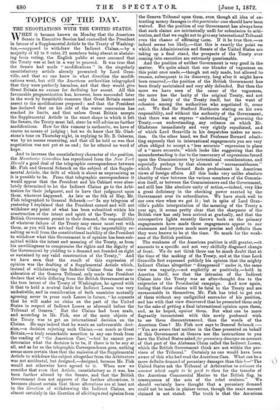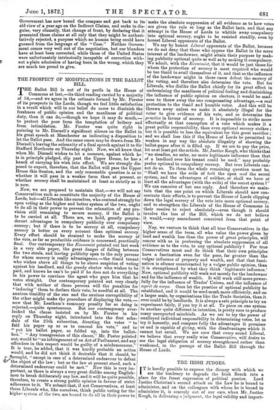TOPICS OF THE DAY.
THE NEGOTIATIONS WITH THE UNITED STATES.
WHEN it became known on Monday that the American Senate in Executive Session had counselled the President in favour of a Supplemental Article to the Treaty of Washing- ton,—supposed to withdraw the Indirect Claims,—by a majority of 42 to 8 votes, 21 members being absent or abstain- ing from voting, the English public at once assumed that the Treaty was at last in a way to proceed. It was true that the Senate had made "modifications " in the singularly unsatisfactory article already presented by Lord Gran- ville, and that no one knew in what direction the modifi- cations went, but still the American authorities telegraphed that they were perfectly harmless, and that they would give Great Britain no excuse for declining her assent. All this favourable prognostication has, however, been succeeded later in the week by formidable rumours that Great Britain cannot assent to the modifications proposed ; and that the President has declared that on his side of the water concession has reached its limits, and that unless Great Britain accepts the Supplemental Article in the exact shape in which it left the Senate, the Treaty must fail, since he will advise no further modifications. How far this rumour is authentic, we have of course no means of judging ; but we do know that Mr. Glad- stone's tone on Thursday night, in replying to Mr. B. Osborne, was by no means reassuring, and that all he told us was that negotiation was not yet at an end ; for he uttered no word of hope.
And to increase the unsatisfactory character of the position, the Manchester Guardian has reproduced from the New York Herald a good deal of the telegraphic correspondence between Mr. Fish and General Schenck on the subject of this Supple- mental Article, the drift of which is about as unpromising as it is possible to be. From that telegraphic correspondence it would appear that the President and his Cabinet were abso- lutely determined to let the Indirect Claims go to the Arbi- trators for their judgment, and to have that judgment upon them, whatever happened. As late as the 8th of May, Mr. Fish telegraphed to General Schenck :—" In my telegram of yesterday I explained that the President cannot and will not withdraw any point of what has been submitted within his construction of the intent and spirit of the Treaty. If the British Government persist in their demand, the responsibility of whatever failure of the Treaty may ensue must rest with them, as you will have advised them of the impossibility re- sulting as well from the constitutional inability of the President to withdraw what this Government is of opinion has been sub- mitted within the intent and meaning of the Treaty, as from his unwillingness to compromise the rights and the dignity of the Government by yielding to a demand not founded on right or sustained by any valid construction of the Treaty," And we have seen that the result of this expression of opinion was the drafting of a Supplemental Article which, instead of withdrawing the Indirect Claims from the con- sideration of the Geneva Tribunal, only made the President declare that while differing from the British Government as to the true intent of the Treaty of Washington, he agreed with it that to hold a neutral liable for Indirect Losses was very undesirable, and in consideration of both countries mutually agreeing never to press such Losses in future, "he consents that he will make no claim on the part of the United States in respect of Indirect Losses as aforesaid before the Tribunal of Geneva." But the Claims had been made, and according to Mr. Fish, one of the main objects of the Treaty was to get an international decision on the Claims. He says indeed that he wants an unfavourable deci- sion,—a decision rejecting such Claims,—as much as Great Britain,—a truly remarkable assertion to any one fresh from the reading of "the American Case,"—but he cannot pre- determine what the decision is to be, if there is to be any at all, and as far as the telegraphic Correspondence goes, nothing seems more certain than that the omission of the Supplemental Article to withdraw the subject altogether from the Arbitrators was not accidental, but designed,—designed, because Mr. Fish would not otherwise have agreed to it. When now we consider that even that Article, unsatisfactory as it was, has been further altered by the Senate, and that the British Government does not approve of the further alterations, it becomes almost certain that those alterations are at least not in the direction of withdrawing the Indirect Claims, are almost certainly in the direction of eliciting a real opinion from
the Geneva Tribunal upon them, even though all idea of ex- tracting money damages in this particular case should have beers waived. But the position of our Government has always been that Bach claims are intrinsically unfit for submission to arbi- tration, and that we ought not to give any international Tribunal even the chance of affirming taem. If it be true then,—as indeed seems too likely,—that this is exactly the point on which the Administration and Senate of the United States are taking up a final stand, the prospects of the Treaty ever coming into execution are extremely questionable.
And the position of neither Government is very good in the matter. We quite admit that our blunder of vagueness on this point once made,—though not only made, but allowed to' remain, subsequent to its discovery, long after it might have been removed,—the position of the British Government has. been firmly maintained and very ably defended. But then the more we have seen of the cause of the vagueness, the more has the laxity of the original Treaty, and not only the laxity of the Treaty itself, but the want of cohesion among the authorities who negotiated it, come out. We find Sir Stafford Northcote stating on his own responsiblity, and without the authority of the Government, that there was an express " understanding " governing the Treaty,—an understanding, any reliance on which Mr. Gladstone immediately and very rightly repudiated, and of which Lord Granville in his despatches makes no men- tion. On the other hand, we find Professor Bernard admit- ting expressly that in international engagements you are very often obliged to accept a "less accurate" expression in place of a "more accurate," which looks like suggesting that the misunderstanding is due to the inaccuracy of expressions forced upon the Commissioners by international considerations, and especially perhaps by that element of "unreasonableness which Professor Bernard finds predominant in American views of foreign affairs. All this looks very unlike absolute identity of view between the various members of the Commis- sion itself, or between the Commissioners and the Government, and still lees like absolute unity of action,—indeed, very like a great deficiency in the checking power exerted by the Government over its subordinates. We have stuck well to our own view when we got it ; but in spite of Lord Gran- ville's public interpretation of the meaning of the Treaty a year ago, it seems pretty clear that the sharpness of the British view has only been arrived at gradually, and that the retrospective lights recently thrown back on the primary engagements have made those engagements appear to our statesmen and lawyers much more precise and definite than they were known to be at the time. So mach for the weak- ness of the British position.
The weakness of the American position is still greater,—it amounts to a specific and not very skilfully disguised change of front. We do not think there can be much doubt that at. the time of the making of the Treaty, and at the time Lords Granville first expressed publicly his opinion that the mighty Indirect Claims altogether " disappeared " under it, the same view was vaguely,—not explicitly or poeitively,—held in America itself, nor that the intrusion of the Indirect. Claims into the Treaty was an after-thought due to the exigencies of the Presidential campaign. And now again, feeling that these claims will be fatal to the Treaty and are unreasonable in themselves, Mr. Fish has tried to get out of them without any undignified surrender of his position, and has with that view discovered that he presented them only for the sake of getting a final international opinion upon them, and, as he hoped, against them. Bat what can be more flagrantly inconsistent with this newly professed wish to see them discountenanced, than the words of the American Case Mr. Fish now says to General Schenck :— "You are aware that neither in the Case presented on behalf of this Government at Geneva nor the instructions to you have the United States asked for pecuniaq damages on account. of that part of the Alabama Claim called the Indirect Losses, which the British Government think are not within the pro- vince of the Tribunal." Certainly no one would have been aware of this who had read the American Case. What can be a more definite demand of pecuniary damages than this ?—" The United States ask the Tribunal of Arbitration to estimate the amount which ought to be paid to them for the transfer of the American Commercial Marine to the British flag, in consequence of the acts of the rebel cruisers." We should certainly have thought that a pecuniary demand could not be made in plainer terms, though the exact amount claimed is not stated. The truth is that the American
Government has now boxed the compass and got back to its old view of a year ago on the Indirect Claims, and seeks to dis- guise, very clumsily, that change of front, by declaring that it presented those claims at all only that they might be authori- tatively rejected, a purpose which, no human being could have guessed from the language of the "Case." Neither Govern- ment comes very well out of the negotiation, but our blunders have at least been corrected, while those of the United States were unfortunately intrinsically incapable of correction with- out a plain admission of having been in the wrong, which they are much too proud to give.



































 Previous page
Previous page